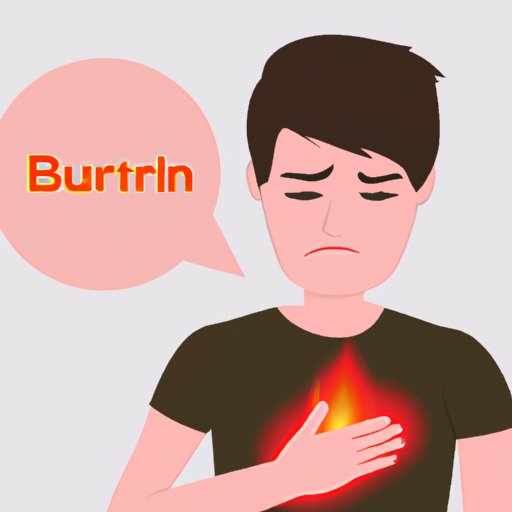
Introduction
Heartburn is a common condition that affects millions of people worldwide. It occurs when stomach acid flows back into the esophagus, causing a burning sensation in the chest and throat. While occasional heartburn is normal, frequent heartburn can be a sign of more serious digestive issues. Understanding the symptoms of heartburn is the first step towards finding relief and improving your overall digestive health.
The Burning Truth: Understanding the Symptoms of Heartburn
The symptoms of heartburn are easy to recognize once you know what to look for. The most common symptom is a burning sensation in the chest, often described as a feeling of heat or pressure. This sensation can be accompanied by a sour or bitter taste in the mouth, as well as difficulty swallowing or a feeling of tightness in the throat.
It’s important to note that while heartburn can be uncomfortable, it is not typically a serious condition on its own. However, frequent heartburn can be a sign of gastroesophageal reflux disease (GERD), a chronic digestive disorder that can lead to complications if left untreated.
Feeling the Burn: A Comprehensive Guide to Identifying Heartburn Symptoms
Heartburn symptoms can vary from person to person, but there are a few common signs to look for. These include:
- A burning sensation in the chest
- A sour or bitter taste in the mouth
- Difficulty swallowing
- A feeling of tightness in the throat
- Bloating or a feeling of fullness in the stomach
It’s important to note that not all people experience the same symptoms, and some may experience only a few or none at all. Additionally, heartburn symptoms can be triggered by a wide range of factors, including:
- Eating spicy or acidic foods
- Consuming large meals
- Lying down or bending over shortly after eating
- Pregnancy
- Smoking
- Stress
- Certain medications
Don’t Let Heartburn Get You Down: Recognizing the Signs and Symptoms
Heartburn is often confused with other digestive issues, such as indigestion or food intolerance. To properly identify heartburn symptoms, it’s important to know the difference between these conditions.
Indigestion, also known as dyspepsia, is a term used to describe a set of symptoms that can include abdominal pain, nausea, and bloating. Unlike heartburn, indigestion is not caused by stomach acid refluxing into the esophagus, and it does not cause a burning sensation in the chest.
Food intolerance, on the other hand, is a condition in which the body is unable to properly digest certain foods, leading to symptoms such as bloating, gas, and stomach pain. While food intolerance can cause discomfort, it does not typically cause a burning sensation in the chest or throat.
The Ultimate Guide to Heartburn Symptoms: How to Identify and Alleviate Them
If you are experiencing heartburn symptoms, there are steps you can take to alleviate the discomfort. Here are a few tips:
- Avoid triggers: If you know what triggers your heartburn, avoid those foods or activities whenever possible.
- Eat smaller meals: Large meals can put additional pressure on the stomach, making it more likely that stomach acid will reflux into the esophagus.
- Avoid lying down after meals: Wait at least three hours after eating before lying down, and try to elevate your head while sleeping.
- Chew gum: Chewing gum can help increase saliva production, which can neutralize stomach acid.
- Take antacids: Over-the-counter antacids can help alleviate heartburn symptoms by neutralizing stomach acid.
While these tips can help alleviate occasional heartburn, it’s important to see a doctor if you are experiencing frequent or severe heartburn symptoms. Your doctor may recommend further testing or prescribe medications to help manage your condition.
From Mild to Severe: Understanding the Range of Heartburn Symptoms
Heartburn symptoms can range in severity from mild discomfort to severe pain. Mild heartburn symptoms may only occur occasionally after eating certain foods, while more severe symptoms can occur frequently and interfere with daily activities.
Severe heartburn symptoms, especially those accompanied by other symptoms such as difficulty swallowing or vomiting, may indicate a more serious condition such as GERD and should be evaluated by a doctor.
Conclusion
Heartburn is a common condition that can cause discomfort but is usually not serious on its own. Understanding the symptoms of heartburn and identifying possible triggers can help you manage your condition and prevent future occurrences. If you experience frequent or severe heartburn symptoms, it’s important to see a doctor to rule out more serious digestive issues.
By taking steps to alleviate your heartburn symptoms and adopting a heartburn-friendly lifestyle, you can enjoy a healthier, more comfortable digestive system.




